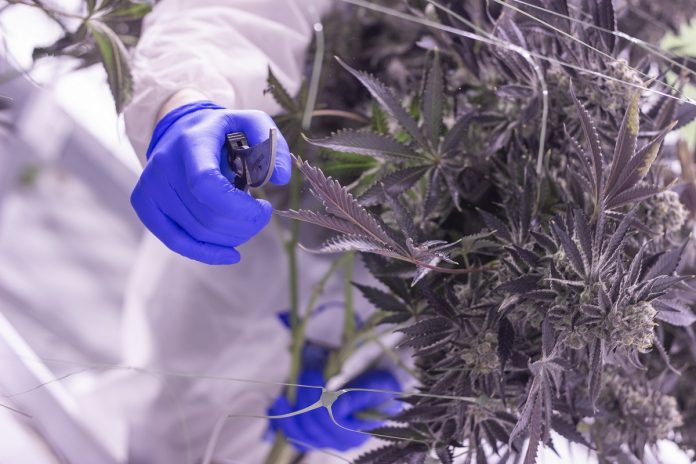We are continuing our weekly “Changing Habits” series featuring cannabis executives’ responses to COVID-19. This week, we are focusing on cannabis cultivators. The coronavirus is threatening to undermine the supply chains in almost every industry. While the cannabis industry faces similar risks, cultivators are creating new operating procedures to ensure that safe access remains available to consumers. We spoke with executives at Chalice Farms, The+Source, and The Green Solution to find out how they’ve adjusted the way they approach cultivating cannabis during the coronavirus pandemic.
For Meghan Miller, chief brand strategist at Chalice Farms, COVID-19 highlights just how important a part of our country’s fabric cannabis has become.
“We’re thrilled to see cannabis be deemed an essential business across the country, and this really speaks volumes to where we have come as a community and industry,” Miller told mg.
The first step to navigate this crisis is to simply keep the doors of a business open—but immediately after, the hard work begins, and it takes a solid team to meet the challenges head on.
“We have a small, talented cultivation team that has stepped up in a big way during this time,” Miller said. “They are all dedicated to their craft, making the best of this pandemic with positive attitudes and a true team mentality. They have led as an example with positive energy in our cultivation and have really created a place of serenity and peace in our garden.”
Having a reliable team has allowed Miller to adjust operating procedures on the fly and to keep enough product in their inventory.
“On top of all the new regulations, social distancing, and deep cleaning, we are in the process of transitioning our farm to a perpetual harvest schedule in order to keep dispensary shelves fully stocked in the coming months and meet the growing demand by consumers,” said Miller.
Bill Campbell, director of cultivation at The+Source, is trying to keep operations running as smoothly as possible with fewer resources than normal at his disposal.
“Unfortunately, we’ve had to learn to perform all cultivation, post-harvest processing, and packaging operations with a much smaller team, in part due to necessary layoffs and in part to appropriately manage social distancing protocols as we work together,” Campbell said.
There is no sugarcoating the fact that many have or will lose their jobs during the pandemic. Campbell is working hard to retain as much of his staff as possible. For those still currently with The+Source, their roles are more important than ever.
“We’ve been proud to see our team step up to the challenge of these changes and take proactive safety measures throughout our cultivation process,” Campbell said. “Our cultivation facility has already had stringent cleaning policies and [personal protective equipment] requirements, and everyone has taken on quite a bit of responsibility and stepped up—we love seeing our staff work together as such a strong team.”
Campbell already was focused on keeping his cultivation areas sanitary but has added some new procedures to ensure the virus does not stall operations.
“We employ anti-microbial and germicidal air filtration, and we’ve reviewed and identified possible high-touch areas outside of cultivation in offices and break rooms to increase sanitation for desks, keyboards, phones, kitchen items, and other areas,” he said.
With over twenty locations throughout Colorado, The Green Solution‘s Chief Executive Officer Steven Lopez has a lot to consider as he organizes his company’s COVID-19 response.
The coronavirus pandemic “has driven us to change procedures to comply with the new health and safety standards implemented by Colorado, and each city we cultivate in,” said Lopez. “That said, we are still able to operate in an efficient manner, even with changes made.”
Lopez believes his team has responded well to the new environment. “As a group they understand why these changes have been made and it addresses their own concerns in regards to personal safety,” he said.
A big part of the operational changes to ensure staff safety is to limit their exposure to one another.
“In order to make sure we had the proper social distancing, we actually transitioned some folks on other shifts so that we could spread out the number of people in each space. This has led to us scheduling out tasks over sixteen hours instead of eight hours in certain departments,” said Lopez.











